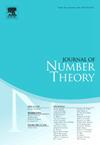On the number variance of sequences with small additive energy
IF 0.6
3区 数学
Q3 MATHEMATICS
引用次数: 0
Abstract
For a real-valued sequence , denote by the number of its first N fractional parts lying in a random interval of size , where as . We study the variance of (the number variance) for sequences of the form , where is a sequence of distinct integers. We show that if the additive energy of the sequence is bounded from above by for some , then for almost all α, the number variance is asymptotic to L (Poissonian number variance). This holds in particular for the sequence whenever with .
关于小加成能量序列的数量方差
对于一个实值序列 ,表示它的第一个分数部分位于大小为 的随机区间内的个数,其中为 。我们将研究形式为 的序列的方差(数方差),其中 , 是一个由不同整数组成的序列。我们的研究表明,如果序列的加法能量由上至下以某个 ,为界,那么对于几乎所有 ,数方差都渐近于(泊松数方差)。这尤其适用于有 .
本文章由计算机程序翻译,如有差异,请以英文原文为准。
求助全文
约1分钟内获得全文
求助全文
来源期刊

Journal of Number Theory
数学-数学
CiteScore
1.30
自引率
14.30%
发文量
122
审稿时长
16 weeks
期刊介绍:
The Journal of Number Theory (JNT) features selected research articles that represent the broad spectrum of interest in contemporary number theory and allied areas. A valuable resource for mathematicians, the journal provides an international forum for the publication of original research in this field.
The Journal of Number Theory is encouraging submissions of quality, long articles where most or all of the technical details are included. The journal now considers and welcomes also papers in Computational Number Theory.
Starting in May 2019, JNT will have a new format with 3 sections:
JNT Prime targets (possibly very long with complete proofs) high impact papers. Articles published in this section will be granted 1 year promotional open access.
JNT General Section is for shorter papers. We particularly encourage submission from junior researchers. Every attempt will be made to expedite the review process for such submissions.
Computational JNT . This section aims to provide a forum to disseminate contributions which make significant use of computer calculations to derive novel number theoretic results. There will be an online repository where supplementary codes and data can be stored.
 求助内容:
求助内容: 应助结果提醒方式:
应助结果提醒方式:


